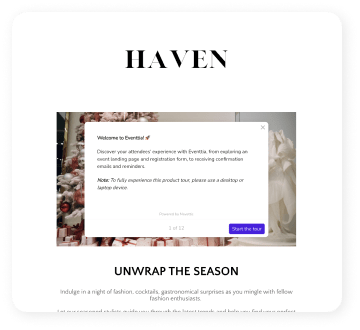As event organizers, we’re used to having some big obstacles thrown our way and we say big we really mean it. From economic crises to erupting volcanoes and now the COVID-19 outbreak, in situations like this, our ability to adapt and overcome these big obstacles is really put to the test.
The things that we once took for granted can quickly change or disappear altogether. Whether that’s travel restrictions, a knock in consumer confidence, or events being canceled. Not only do these factors have a big impact on how we go about our daily lives, but they also have an equally big impact on our businesses.
Weak ARR, being unable to achieve quarterly or yearly goals, and high churn rates are likely to be some of the issues that companies in every industry will encounter in the coming months. And although it might sound counterintuitive, these moments of crisis can be extremely beneficial when focusing on the right things i.e. innovation, strategizing, and experimenting.
Situations like this make it a lot easier to identify strengths and weaknesses. This is important because when the storm has passed it’s important that you’re able to hit the ground running. As hard as it seems, there are plenty of examples out there. Take, for instance, Lego which in the 2008 recession saw profit grow by 63%, as they took the decision to expand into Asia and make more concentrated efforts to build sales in Europe. Or, Domino’s who announced that it was making a change to its special recipe, investing millions in the process on research and a marketing campaign to raise awareness. This turned out to be a huge success, and helped drive sales and profits.
What both of these companies did so well is that they adapted, they understood that in light of the circumstances something had to change. So to help you with this, we’ve drawn up 5 tips on how to get an advantage during the crisis and become stronger:
Tip 1. Learn more about your industry and your clients
The more knowledge you have the more you’ll be able to identify the opportunities and threats facing your business, what you can do to overcome them, and how you can start planning for the future. That’s why it’s important to spend as much time as you can reading up and educating yourself about your industry, marketing, and your clients.
It’s not just you that’s affected, shockwaves are going to be felt by others in the industry. This will be a good time to see how the industry is adapting. And research will help you identify some of the major pain points that your industry faces and what’s being down to address them.
In addition to this, make sure that you spend time learning more about your clients. Not only should this include research but you should also be speaking to them on a regular basis. This will help you get insight into what challenges they face, why they chose you, along with other general information. Not only will these really develop your buyer personas, but it will also make it much easier to position yourself on the market, because you know what differentiates you from everything else on the market.
Tip 2. Review and improve your product and website
Leading on from the last point, and specifically what feedback your clients have been giving you, use all of the knowledge that you have accumulated to review and improve your product and website. For the former, carry out customer feedback surveys and take a look at sites such as Capterra and G2 to really understand what your clients like and dislike about your product.
Remember to put yourself in the shoes of your clients. What pain points do they have? How has the crisis impacted that? Why are they using your product? These factors go a long way in developing a better understanding of your product. Identify short and long term improvements and create an action plan for how you’re going to get there. Also, think about what the environment is going to be like after the crisis and how the improvements will fit in with that.
Much of this also applies to your website. Ask for customer feedback and make sure that the website is aligned with your buyer personas. A good website should always communicate a strong message to your audience. Also, have a think about the interface of your website, make sure that it’s easy to navigate and that you have all the information presented in an easy to view format.
Tip 3. Re-organize the work of your teams and focus on the projects you were delaying
When normal business operations are all systems go, it can be very easy for other projects to be put on the backburner. However, when things start to quieten down, it’s always a good time to reorganize the work of your teams and identify projects that you were delaying, or simply didn’t have time to do.
Whether that’s an SEO audit, or preparing a new email campaign. All of these projects, however big or small, will have a positive impact on your business. They will also give you a big advantage when things start to pick up because you’ll be able to get started straight away on your core business without having any other distractions.
Tip 4. Decide how you’ll be accompanying your clients during the crisis
The last thing you want is to lose any of your clients. That’s why it’s important that you come up with a strategy for guiding your clients through the crisis. The best way of doing this is to get on the phone to them straight away and ask them what challenges they’re facing. Show that you’re there to help not just from what you say but more importantly, through your actions.
If there are any obstacles making it difficult for them to continue business try and offer solutions. Also, make sure to maintain regular contact with your clients. This will help reassure them and make your company more approachable. Remember that in times of crisis, above everything you need to be proactive.
In addition to this, make sure that you have a good communication strategy to go with this. First off, send an email that acknowledges the crisis and tell your clients that you’re there to support them. Then provide regular updates about what you’re doing to support them but beware of getting the balance right, don’t overdo and don’t underdo it. Finally, adapt your content strategy and provide your clients with valuable information and insights to guide them through the crisis.
Tip 5. Re-organize your business strategy, rethink your value proposition depending on your industry, and ask how the sanitary crisis affected you
By following tips 1 and 2, you will have already collated the necessary information. Now it’s time to have a think about the bigger picture that makes your business what it is. What’s your value proposition? How does this compare to your competitors? The answers to these 2 questions will provide the starting point for how and why you should re-organize your business strategy.
Times of crisis are always a great time to reflect and get the answers to some of the bigger questions that have to do with your business.
Key takeaways
- Although it might sound counterintuitive, moments of crisis can actually be extremely beneficial when focusing on the right things i.e. innovation, strategizing, and experimenting.
- This is one of the best times to learn about your business. Is it particularly susceptible to the crisis? How is this impacting your clients? What problems are they experiencing? And what can you do to help them?
- Finally, you’re never going to be able to predict a crisis and its possible consequences. But at the same time, you can still be prepared. Use your time wisely, identify your strengths and weaknesses, reorganize your business strategy, then when all of this clears over you can hit the ground running.






